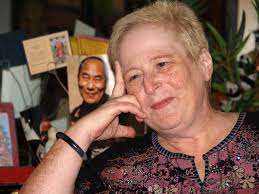Monday, June 28, 2010
8,172
8,172 views and perhaps a total of 6 comments over the lifetime of this blog? Is anyone out there?
Tuesday, June 22, 2010
Back in Boston: Other People's Mail
Imagine the fall rolls around and my students and I are playing "my summer vacation." Sally went to the Virgin Islands to play Carnival and visit her folks. Rufus hiked the Himalayas, and Joan studied abroad in Prague. It's my turn and, giddy, I say, "I spent the summer in a library!" It probably wouldn't win me any awesome professor points, would it?
And yet, there's something wonderful about the library I spent the past 2 weeks in, researching for my book project. The Massachusetts Historical Society (MHS) is a cool, quiet marble shrine to everything that means anything to people who want to preserve early American culture. The first time I sat down under the librarian's watchful eyes to touch Abigail Adams' letters -- to trace the worry for her husband in her slanted penmanship, to wonder if the paper's softness came, at least in part, from John's propensity to read her missives over and over again -- I became addicted. The yellowed pages, smudges, stains, misspellings, crossouts and cracked red wax seals made the clean, crisp, white, ellided, footnoted, neatly edited published versions of these letters look like lies. The letter's body often tells as much about the correspondence as the words on the page do. There is no substitute for the Real Thing.
This time around, I was visiting the MHS to read loyalist's letters -- you know, women who sided for the "wrong team," the Brits, in the Revolutionary War. And by the end of it, I was with the Tories. According to their version of the story, the Patriots were undisciplined, ungrateful, unfaithful children. The American soldiers were rude, vile, indecent men who barged into women's homes, often drunk, to make a spectacle of themselves before stealing wood and valuables to take with them back to camp. Those that fled the war took agonizing journeys to Nova Scotia to establish towns like Halifax that would become safe havens for British sympathizers, but they often did so while leaving behind brothers, husbands, and sons, who stayed behind to defend land the families would eventually have taken from them by the eighteenth-century version of Homeland Security (then called Committees of Safety).
At any rate, the whole trip got me to thinking about the death of letter-writing, and how letters and journals, like this blog, are at best semipermanent, so easily taken down and deleted that I ache for the archivists and historians who will want to know anything about millenials in the Digital Age. What will we leave behind?
Monday, June 14, 2010
Back in Boston: Edie Sedgwick
So yesterday, after a dinner of buccatini and pancetta, I needed a long stroll, so Andrew & my friend Lisa & I decided to cut through Boston Commons to see Faneuil Hall at sunset. I wanted to show Andrew the newest crop of baby ducklings, but when we got near the pond to see them, we found, instead, two men flicking water on the poor creatures. They turned to see us gawking, and, per my luck, one of them stumbled toward me.


"EDIE!" he said.
Here we go, I thought.
"EDIE SEDGWICK!"
"I do not look like Eve Sedgwick," I said. "Eve Sedgwick looks like a man." I was pretty impressed that someone as high as this guy could conjure up an image of a respectable feminist critic like Eve Sedgwick at the height of his hallucination, but was just as confused as to why he'd feel comfortable calling such a formidable woman "Evie." In case you don't know her, this is Eve Sedgwick:

He seemed confused by my response, so he wrinkled his brow and tripped over a tree root. He decided I couldn't speak English very well, so he started yelling at me.
"YOU LOOK JUST LIKE EDIE SEDGWICK!" he screamed. "FROM THE 60s!"
I thought the most logical way of dealing with him was to yell back.
"I DO NOT. LOOK LIKE. A MAN."
This was all entirely too confusing for him and, anyway, his companion was trying to sit in a perfect stranger's lap. She was flapping her arms trying to shoo him away, but it wasn't working. He swerved toward his friend and pulled him down the pathway away from the ducklings and, thankfully, away from us.
Of course, it was only after hours of giggling about it did I find out who Edie Sedgwick, 1960s pop icon, was (see below).

I have to admit, I was a little relieved.
Wednesday, June 9, 2010
Back in Boston
Boston looks different in the morning than it does in the day. By day, I can't help but associate Boston with the belly of a beast, mostly because, by day, I ride the subway, which smells like blown-out tires and hot exhaust and dirty feet and old newspapers. But this morning, I saw Boston at daybreak when I went for a jog at the Commons. And it was an entirely different scene.
There's a long hidden stretch of pavement that runs along Commonwealth that's shaded by old, long-fingered trees and tall apartment buildings. Bronze statues of women I've studied for years but thought no one knew about interrupt the sidewalk. Lucy Stone. Phillis Wheatley. People pour out of tiny apartments with big dogs on leashes. German shepherds, fat labradors, unnamable English-looking showdogs that probably cost more than my car. How do they all fit inside, I wonder? Then there are the impertinent little creatures -- Jack Russells, Rat Terriers with bellies larger than their little legs, Wirehairs with perfectly straight earpoints and leather collars, walked by women wearing 3-inch high heels at 6 o'clock in the morning.
There's no way I could ever fit in here, were I to momentarily go insane and move to New England. This has a little to do with the fact that I'm a hick and a little more to do with my complete lack of urban fashion sense. My Coldwater Creek sweater and so-five-years-ago wedges make me look dowdy around the women who shop on Newbury street, where they apparently develop some superhero ability to pair breezy pale colored skirts with floral vintage-but-not-bargain-basement collared button-downs. Their long bare legs seem impervious to the weather, which is a steamy 50 degrees in the middle of June. I wear a hooded jacket and scowl at them as I clunk down the street but it doesn't make me feel any less out of place.
Subscribe to:
Posts (Atom)